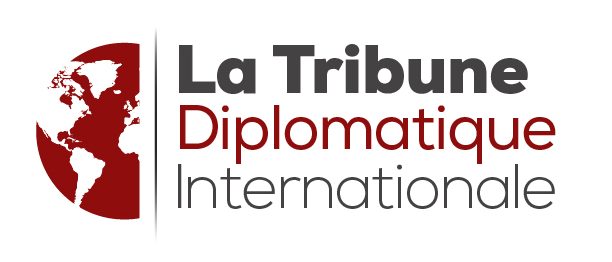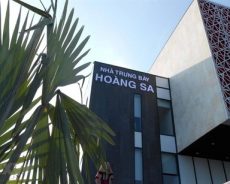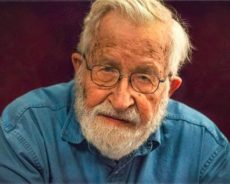
Mohsen Abdelmoumen: You visited the campus of UCLA, the University of Los Angeles, where you met Mona, spokeswoman for the university’s Palestine solidarity movement. What is the current situation on the UCLA campus?
Ed Rampell: First of all, thank you for your interest in and kind words about my work. More importantly, it is truly a pleasure and an honor to have an opportunity to address the people of Algeria, who I have held in high esteem since I was 14-years-old.
To answer your question: on May 15, 200-demonstrators gathered to commemorate Nakba Day. According to the university’s newspaper, The Daily Bruin, the remembrance was: “Hosted by campus organizations including Students for Justice in Palestine and the UC Divest Coalition at UCLA, the event began at 4:30 p.m. with speeches and included a march to the UCPD [university police] station on Westwood Boulevard. The group then went to Royce Hall at around 6:30 p.m., ending the event with the announcement of the United Auto Workers Local 4811 union’s authorization of a strike.”
This UAW chapter represents UC academic student employees and graduate students, academic and postdoctoral researchers and is protesting the forcible dismantling of the UCLA Palestine Solidarity Encampment by police and repression of free speech rights of the pro-Palestinian protesters.
On May 18, it was announced that UCLA’s Academic Senate, which consists largely of faculty members, rejected censuring or making a no-confidence vote against the university’s Chancellor, Gene Block, due to his role in how the campus protests were handled.
Meanwhile, south of UCLA in neighboring Orange County, according to press reports, police raided another pro-Palestine encampment on Nakba Day at the University of California at Irvine, arresting 50 people at UCI.
How do you analyze the awareness among students at American universities, including UCLA, of the need to support the Palestinian people in their just cause?
At least 80 campuses have held pro-Palestinian protests and about 3,000 demonstrators have been arrested. First and foremost is their ethical outrage at the carpet bombing of mostly civilians in Gaza, the destruction of their already meagre infrastructure, in particular the devastation of their healthcare system and hospitals, plus the imminent threat of famine. Out of their sense of basic humanity they are being driven to take direct action, as the students are bombarded with images via social media and MSM of children and even infants, along with unarmed women, being literally bombarded, blown to bits and brutalized. The longtime occupation, siege, ongoing settlements in the West Bank plus allegations of apartheid-like conditions also feed into the protesters’ sense of moral righteousness.
More than 35,000 dead and many more wounded. Didn’t God say: “Thou shalt not kill?”
But beyond conscience and consciousness, let’s also look at this from a CAPITALIST perspective. The tuition costs for UCLA undergraduates who are California residents are $42,00-plus per academic year, while out-of-state undergrads pay $76,000-plus per academic year (see: https://admission.ucla.edu/tuition-aid/tuition-fees). (Bear in mind that this is for a PUBLIC university; private colleges are far more expensive.) UCLA has a multi-billion-dollar endowment. The pupil protesters are demanding that the university’s administration “disclose… full-transparency to all UC-wide and UCLA Foundation assets including investments, donations, and grants.” They want to know if the finances of their university are supporting militarism, and in particular, the war on Gaza.
If so, they demand: “Divest: Withdraw all UC-wide and UCLA Foundation funds from companies and institutions that are complicit in the Israeli occupation, apartheid, and Genocide of the Palestinian people.” The primary business of a university is supposed to be education, so one could argue that students (many of whom have to take out extremely onerous student loans that saddle them with decades of debt) and their families are, in a sense, “investors” in their campuses, as well as U.S. taxpayers. As such, using the rationale of the free market system, does the student body – which is the raison d’etre of the university – have a right to know what an economic system they contribute to through their tuition (as well as tax dollars) spends their money on? And do they as sort of shareholders have the right to determine how that money is spent?
Is their money spent on the devastation of the Palestinian people money well-spent? This feeds into their growing antiwar sentiment, as well as among non-student sectors of the public-at-large, not just those who lean Left but also isolationists who think our tax dollars could be put to better use at home, instead of for the endless war machine of America, which is the exceptional war monger of the world, the indispensable arms dealer of the world.
In your article “The Iron Heel of the State at UCLA”, you refer to Jack London’s book. UCLA students, using the slogan: “Biden Biden, Whattaya Say? How Many Kids You Kill Today?” point an accusing finger at the President of the United States. Do you think this movement will have an impact on the November presidential elections?
Yes. Definitely. Along with the phenomenon of the “uncommitted vote” in the Democratic Party primaries, the Biden campaign is increasingly anxious that the youth vote, along with Muslim/ Arab voters, won’t turn out to cast their ballots for Biden in particular and the Democrats in general. In narrow, tightly contested races, especially in “battleground states” like Michigan, where every vote counts, this could make the difference between victory and defeat. Especially when combined with the challenges of non-partisan, independent and third-party presidential candidates, such as Prof. Cornel West’s leftist campaign that strongly supports a ceasefire in Gaza.
The above chant re: Biden is a direct reference to the antiwar slogan of the late 1960s: “Hey, Hey, LBJ, How Many Boys You Kill Today?” Vietnam proved to be Pres. Lyndon B. Johnson’s undoing; it knocked him out of the presidential race in 1968. Then, the antiwar students and other pro-peace protesters staged massive demonstrations at Chicago during August, 1968’s Democratic National Convention. These manifestations were brutally, savagely suppressed, and the violence in Chicago is widely believed to have cost the Democrats lots of support. Running on a “law and order” platform, Republican Richard “Tricky Dick” Nixon was elected president in November, 1968.
Take one guess where the Democratic National Convention is scheduled to take place this summer? None other than Chicago. Will history repeat itself?
You wrote the article “Civil War, Alex Garland’s Gripping War Between the Cinematic States” in which you evoke the civil war between the Red States and the Blue States of the United States, the Democrats against the Republicans. In your opinion, isn’t there a risk of civil war in the United States?
Could be. However, one can’t predict the future – but one never knows…
You wrote the article “The Battle of UCLA”, which refers to “The Battle of Algiers”, the film that chronicled my people’s struggle against French colonialism. Knowing that on some campuses, protesting students screened Pontecorvo’s film “The Battle of Algiers”, how do you explain this symbolism?
Pontecorvo’s masterpiece powerfully dramatizes the implacable resistance of a heroic people who, fighting against great odds, couldn’t be defeated. Let me tell you a story:
The first time I saw The Battle of Algiers was at a 1969 fundraiser for the Black Panther Party at a repertory cinema in Manhattan, I believe it was the Elgin Theater. The mood was very militant, very strident, very bold, and this ambiance plus, of course, the film electrified my 14-year-old self. When our group of radicals left in the Volkswagen driven by my older friend Joe, we passed by an NYPD patrol car. Inspired by the movie, I rolled down the window and started shouting at the policemen: “Off the pigs!” I thought my comrades would admire my bravado but instead, they were horrified, told me to shut up, and drove off. Older and wiser, they were afraid that the police would arrest and/or beat us.
But that’s how The Battle of Algiers inspire us!
BTW, here’s a fun fact: The 1938 Hollywood movie Algiers starring Charles Boyer and Hedy Lamarr was co-written by John Howard Lawson, who was reputedly the head of the Hollywood branch of the Communist Party and one of the blacklisted “Hollywood Ten” in 1947.
Isn’t the reference to the Algerian people’s liberation struggle fraught with meaning? Aren’t we in the presence of a revolutionary process whose vanguard in the United States is the student movement?
It’s hard to say. In The Wretched of the Earth, Frantz Fanon wrote about Spontaneity: Its Strength and Weakness. Will the student revolt trigger the creation of national organization? Or will it remain a single issue cause, will the sizzle fizzle out when (if?) the war in Gaza dies down and/or when the students graduate and leave campus? If an organization is created, will it become intersectional and reach out to other sectors of the masses, the working class, and embrace other causes around the common interests of all of the oppressed?
Listen comrade, I’ve been predicting the Revolution every year since 1969 – and I’m still waiting. LOL! You can’t predict the future.
You’re interested in the work of Frantz Fanon. What does Frantz Fanon represent for you?
I lived for 23-plus years in the Pacific Islands, and with the possible exception of the Caribbean, Oceania is the last geographic region on Earth dominated by colonialism. Not by imperialism – I mean by old-fashioned colonialism, like Algeria before its independence.
Fanon is best remembered for The Wretched of the Earth, which is, to be sure, the Bible of Third World liberation. However, his 1952 book Black Skin, White Masks is also brilliant in how it describes and analyzes what colonialism and racism does to human psychology, the soul. For instance, at the workplace in Hawaii, Native Hawaiians speak in “standard English,” but amidst themselves and other locals they’ll speak pidgin English – although most no longer can speak or understand the Hawaiian language per se. Under colonialism, Indigenous Islanders wear a persona that masks their authentic inner, Indigenous selves, to conform to expectations set by the dominant colonial “other,” in order to survive, to go along to get along. It’s heartbreaking to witness, and Fanon put his finger right on it.
I’m currently reading Adam Shatz’s excellent 2024 The Rebel’s Clinic, The Revolutionary Lives of Frantz Fanon. Highly recommended.
In your opinion, why does the United States unconditionally support Israel in its genocide of the Palestinians?
This is complex. On the one hand, the U.S. and Israel have something in common – they are both white-dominated settler states. In this view, the Palestinians are to ultra-militaristic pro-Zionists what “Indians” were to the “Wild West’s” palefaces. Also, according to Reuters (https://www.reuters.com/world/pressure-rises-biden-democrats-reject-aipac-funds-2024-03-12/): “Biden, a former vice president and senator, has long been a top recipient of the pro-Israel lobby, receiving over $5.2 million in support over the last 34 years, the most of any Congressional recipient, according to OpenSecrets.”
On the other hand, Jews have been a persecuted minority for ages, especially during the Holocaust. There’s a sense that all peoples deserve a homeland – especially those who have suffered from genocide. However, the Palestinians had absolutely nothing whatsoever to do with the Nazis’ “final solution of the Jewish question” – white-skinned Aryan Europeans did that. A people may deserve a homeland – but not at the expense of others who can trace their ancestral roots to the same territory.
You’ve written some very interesting articles and a book about Hollywood called “Progressive Hollywood”, in which you interviewed some of the best-known directors and actors. How do you explain the decline of the left-wing movement in Hollywood?
I disagree with your premise. Rustin was a fabulous biopic about how a Black socialist helped organize 1963’s famous March on Washington. Civil War, which you mentioned and was a box office hit, is not a leftist movie per se but as you indicated, it definitely does raise important questions about the political situation in the USA. Oppenheimer was imperfect but was very strongly against the anti-communist Red Scare of the 1950s, and it swept the Academy Awards, including winning for Best Picture and Best Director.
Cinema Libre’s just-released feature I Am Gitmo is a gut-wrenching expose of U.S. torture of Muslims at Guantanamo Bay. Socialist Ken Loach’s latest movie, The Old Oak, about Syrian refugees in Britain, was recently released in America.
There are also many progressive documentaries coming out, such as Israelism, a powerful critique of the “Israel-right-or-wrong” viewpoint among American Jews. Robert Greenwald’s Beyond Bars chronicles San Francisco’s left-leaning District Attorney, who was raised by former members of the militant Weather Underground. A Double Life documents a New Left fugitive who was wrongfully charged with participating in the fatal shootout at San Quentin prison involving Black Panther George Jackson. Stamped from the Beginning: The Definitive History of Racist Ideas in America, based on Dr. Ibram X. Kendi’s 2016 book, is stellar and available on Netflix. Radioactive: The Women of Three Mile Island is about female-led resistance to the 1979 nuclear disaster in Pennsylvania that alleges radiation poisoning.
A number of documentaries about the January 6 attempt to prevent the peaceful transfer of power and about America’s far right are being made. Danish filmmaker Christoffer Guldbrandsen’s A Storm Foretold–Roger Stone and Die was released in the U.S., while Sebastian Junger and Charlie Sadoff’s Against All Enemies exposes the role of U.S. combat veteran in rightwing militia groups. And the great Oliver Stone is working on a documentary about Brazil’s left-leaning president, Lula.
As much as we’re seeing a big protest movement among students in American universities who support the Palestinian cause, we’re witnessing a great silence in the film world, particularly in Hollywood, apart from a few rare exceptions. How do you explain this?
Per the above, I disagree with your premise. There have always been filmmakers of conscience and consciousness in Hollywood and there always will be.
You’re very interested in Algeria and its history, and in addition to being a historian, you’re also a very good film critic. Wouldn’t all this encourage you to work on Algerian cinema one day? Your expertise would certainly be welcome in Algeria.
Thanks for the compliment. If Algeria would like to provide me with the opportunity to visit your country and study your film industry, I’d be delighted to do so. I could write a lot for my American outlets about the Algerian cinema – perhaps even do another film history book. I’d love to see what Algeria, the country that gave us the classics The Battle of Algiers and Costa-Gavras’ Z, has done with motion pictures – and what you have done with 62-years of independence! Invite me, and I shall come.
Interview realized by Mohsen Abdelmoumen
Who is Ed Rampell?
Ed Rampell is a Los Angeles-based film historian and critic, and author of Progressive Hollywood: A People’s Film History of the United States, in which he interviewed a wide range of cinema personalities, including producers Jerry Bruckheimer and Robert Greenwald, actors including Jack Nicholson, Martin Sheen and Dennis Hopper, and directors such as Michael Moore, Spike Lee and Oliver Stone. He has written for Variety, Television Quarterly, Cineaste, New Times LA, The Progressive and other publications. He is the co-author of The Hawaii Movie and Television Book and three other books on film history. He has lived in Tahiti, Samoa, Hawaii and Micronesia, reporting on the independent and nuclear-free movements for Pacific and Hawaiian sovereignty for numerous media outlets including ABC News, Reuters, AP, Radio Australia, Radio New Zealand, NewsWeek, Honolulu weekly, and more.
Published in French in Algeriepatriotique: https://www.algeriepatriotique.com/2024/05/20/interview-ed-rampell-cest-ainsi-que-la-bataille-dalger-nous-inspire/




